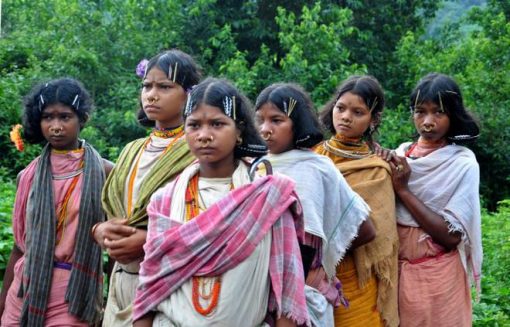
In Jharkhand’s Niyamgiri region, Dongria Kondhs, a particularly vulnerable tribal group (PVTG), have been waging a sustained struggle for their land claims and to safeguard their most revered mountain god, Niyamraja for several years. As part of their resistance, the tribals have been struggling against the mining projects in the region by corporate giant Vedanta. The firm established an aluminium refinery in 2006 in Lanjigarh, despite the non-consent of villagers in and around the area.
The villagers have stated that they are being forced out of their own homes to pave the way for the corporate project, road construction for which is currently in full swing.
Speaking to NewsClick, an activist from the Save Niyamgiri movement, on condition of anonymity, said, “The scale of harassment is increasing now. Earlier, during the protests against the refinery project, cases were registered against 300 unnamed. This ongoing crackdown, including threats and harassment, has forced the people to leave their houses in Lanjigarh and the Dongria Kondh villages in Niyamgiri.” He added that the villagers are being threatened that if they oppose the road construction, they will be put in jail. He said, “Not only that, the opposition to the road construction is being perceived as having maoist objective, and a move to restrict development in the state. The key here is that the people are forced to live under constant fear.”
Reportedly, the villagers are no longer able to access the weekly bazaars, to sell their produce or to buy any supplies in the face of this crackdown, making it a virtual lockdown for the region. In the last few months, about 300 people have been forced to leave. Previously, NewsClick had reported on the villagers being forced to move to plains in order to avail the benefits of the Prime Minister’s Awaas Yojana. Locals from about 10 villages have confirmed this announcement by the district administration and there are about 100 villages in the Niyamgiri district. The villages include Dhamanapanga, Denguni, Gorata, Monda, Trahili among others.
The Niyamgiri Suraksha Samiti (NSS), an umbrella body of activists and civil society members in the state had asserted that, “there is no legal basis for the administration to impose such conditions” and therefore, this is being seen as a pressure tactic. Moreover, NSS activists opposing road construction are being threatened by the police that they will be framed as “Maoists” and then jailed. Construction is now being carried out at full swing with Niyamgiri Suraksha Samiti activists cornered and forced to migrate. The same pattern of harassment was seen in Lanjigarh when the police started randomly arresting and detaining people in the aftermath of the violence at the refinery where a dalit activist and a security personnel were killed.
In March this year, two persons were killed and 50 injured at Vedanta’s aluminium refinery. The deaths happened after Odisha Industrial Security Force (OISF) personnel mercilessly used batons on the displaced tribals who were protesting and demanding jobs. One of the persons who was killed following the protests was Ambedkarite activist Dani Batra, who was reportedly beaten to death by security forces. Another activist, Kadarka’s family is also fearing for his life as this is not the first time he has been hounded by the state police. In 2018 too, he was tortured in jail for over four days, leading to grave injuries on his body. A week before the violence at the Lanjigarh refinery, one of the founder members of Niyamgiri Suraksha Samiti (NSS), Lingaraj Azad was arrested and later released on bail. He was arrested for protesting against the forceful construction of CRPF camps in various parts of the Niyamgiri hills.
The residents of Niyamgiri also accuse the firm of forcefully acquiring over ten acres of village common land without the necessary clearances. According to their claims, not only did the companies reportedly ignored community concerns but in connivance with the state and Union government, blatantly ‘breached’ state and national regulatory frameworks, and overlooked adherence to international human rights standards displacing over a hundred families. The villagers were also promised job opportunities at the plant and free education for their children. However, the project in turn has now become a symbol of tribal resistance and brutal crackdown by the state.




